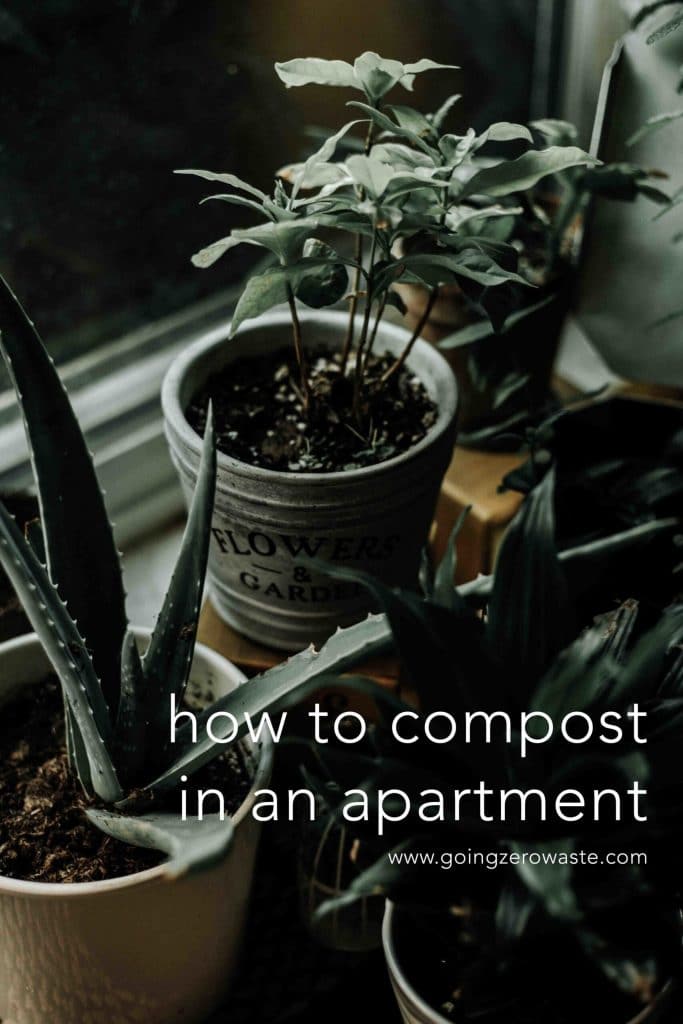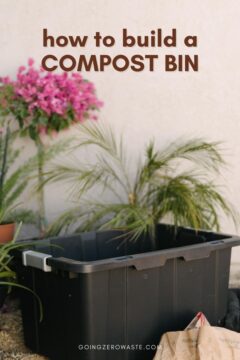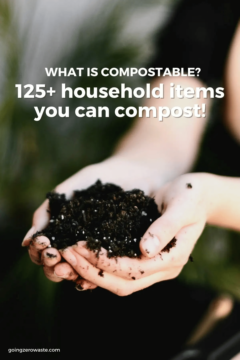Last Updated on February 9, 2022
It’s easier than you think to learn how to compost in an apartment. Composting can be done anywhere with very few supplies needed.
Indoor composting can make a huge effect on our planet. The average US household produces 650 lbs of organic trash a year, but most of that is landfilled. In fact, 60% of our landfills are full of organic matter. You think it would break down since it’s dumped into a giant hole in the ground, but it doesn’t because landfills aren’t aerated.

It’s called anaerobic decomposition, and all of that oxygen deprived, organic matter now releases methane into the atmosphere.
Methane is 72% more powerful than CO2 which means it’s responsible for hastening climate related issues. You can read more about greenhouse gasses in my post How to Offset Your Carbon Footprint and Why You Should.
Because organic and inorganic materials are mixed together, think your trash bags, plastic, and food scraps it creates a perfect preserved atmosphere.
Things like guacamole, hot dogs, and newspapers have been found in perfect condition from the 50s! (source)
Think of all the good we can do just by removing organics out of our landfills.
I have a huge guide for backyard composting, but what if you don’t have a backyard? Can you still compost? Of course, you can!
If there’s only one thing you take away from this blog, I want you to understand the power of composting. Composting is the most effective tools in the zero waste tool belt.
Table of Contents
how to compost in an apartment
While you may have to get creative an indoor compost bin isn’t a nasty item that we should all dread.
As a matter of fact, there’s a misconception that compost is stinky, but it’s not. Compost doesn’t really smell like much at all.
If anything, it’s just slightly earthy. The reason your trash stinks is that you’ve mixed organic materials with non-organics which are preventing the decomposition process.
I’ll break down a few options so you can decide which small compost bin or composting method is perfect for you.
worm composter bin:
A worm composter bin is one of the most common forms of indoor composting.
When it comes to indoor composting, it’s important to keep a good mix of carbon and nitrogen. Carbon is paper, cardboard, newspaper, dry leaves, etc.
Since shredded paper can’t be recycled, it’s a great addition to keep your compost balanced! For more information and recycling tips be sure to check out my blog post How to Recycle Paper the Right Way!
Nitrogen is going to be most of your food scraps, and ideally, you want to aim to keep your compost around 50% carbon and 50% nitrogen.
There are several tutorials online, where you can make your own compost bin or you can buy a worm bin. I have a worm bin 360 that I really liked! I unfortunately kept my worm bin outside and sent 1,000 worms to worm heaven. *May they rest in peace*
Worms like to be kept around room temperature, so they’re the perfect indoor pet that happens to like eating your food scraps. Just don’t add dairy, meat, or citrus peels.
You can typically find red wigglers, the composting worm, at your local bait shop.
bokashi indoor composting:
I’m super intrigued by the bokashi indoor compost bin. It seems really simple, almost so simple that it’s too good to be true. It’s a giant bucket and you add all of your compost including meat and dairy into the base.
You mash it all down and then add in an activator mix which is full of microbes which hastens the process of decomposition.
According to the website, you should have compost in 4 weeks. I don’t think you have to keep a balance of nitrogen and carbon, I believe you can only add food scraps and the activator mix takes care of the rest!
trench method:
If you don’t have a yard, this is definitely a reconnaissance mission. Trench composting is where you dig a hole in the ground and bury your compost. It’s really easy, effective, and inexpensive.
The only problem is finding a place to do it.
electronic composting:
Yep, they actually make electronic indoor composters that will turn your food scraps into compost overnight! How cool is that?
If you want something that is no fuss and instant check out the foodcycler.
farmers market:
Most farmers at my farmer’s market have large compost piles. They take odds and ends off the vegetables that people don’t want like carrot tops or radish tops (even though you should 100% be eating those things and check out my post on 8 Innovative ideas to Cook with those Food Scraps) to take back to the farm and compost.
Ask one of the farmers if you can bring your scraps to add to their pile.
I also have neighbors and friends with chickens who are more than happy to take my scraps off my hands. It certainly doesn’t hurt to ask around and see who could use them.
community garden:
Community gardens often have compost plots. See if you can join the community garden and add your food scraps to the pile. Who knows, you might make some new friends and collect some delicious produce in the process.
city wide service:
Check to see if your city offers composting or if there’s a business in town that collects food scraps. Often times someone is out there performing that service, it just takes a little bit of googling.
My city doesn’t offer municipal compost, but they do subsidize backyard composters for people. All it took was a short google search!
get online:
There are so many ways to plug into groups and find people with the internet today. If you’re trying to compost, I’m sure there’s someone in your area that has chickens, a composter, or a large garden check out the app ShareWaste.
where do I keep my indoor compost bin?
For indoor composting you definitely want a small compost bin. Place the compost bin in a closet, in your basement, on the counter, or even in a cabinet. Ideally, your indoor composter should be kept in a dry place that is reasonably dark.
can i speed up compost?
Yes, there are several things you can do to speed up your compost. Here are a few tips:
- Keep it warm. Heat will speed up the process tremendously. Cold composts can literally take years to mature properly.
- Add some twigs. Putting some twigs along the bottom of the bin. This will allow air flow and will speed it up.
- Don’t forget to turn it. Stir it frequently to allow more oxygen to get into the compost. I recommend turning it at least once every other day if not more.
- Mix in greens. Grass clippings, manure, and leaves are all great options. Be sure to include them into the soil.
what do i do about maggots?
If you end up with maggots in your small compost bin, don’t stress out! I realize that seeing a bunch of maggots moving around in your compost can be pretty creepy, but it’s a good thing.
They help break down items in the compost and in turn, causes the compost to mature faster. If they are too much for you, you can make some changes and prevent more of them.
Simply add more grass, cardboard, or even shredded paper. This will keep the compost bin drier and not as inviting for the maggots. Additionally, you should add a lid so flies can’t get it in and bury the food so it’s not on top.
This post contains affiliate linking. This means if you choose to purchase one of these items I will make a slight commission for referring you. You can read more on my disclosure page.












THANKFULLY I now have a backyard and we’ll be building something long-term. But for the past year I lived in an apartment with a balcony. I got 2 10-gallon paint cans out of the trash, drilled holes in the bottom, set a pan under them, and did ‘traditional’ green/brown composting in it. Then found someone to take it off my hands.
I know most people go the worm route, but it you’re really tight on funds and/or grossed out by worms like I was, this is a relatively simple solution.
Sounds like a great solution!
Have you used a compost spinning bin? I’m thinking to buy one but not sure how it works without insects?
Love how many methods there are to make this happen in an apartment! I think not being able to compost in a city is a pretty common misconception. BTW, if anyone is looking for a compost service or drop-off site near them, I keep a big guide here., in case it’s helpful: https://www.litterless.co/wheretocompost
Thank you for reminding me of this post! I will add it to the body.
This may be a stupid question, but how is the trench method different from landfills?
Landfills also have inorganic material around them making it impossible for organics to decompose. Landfills aren’t aerated either. Hot dogs, newspaper, even guacamole has been found from the 70’s perfectly preserved and intact.
50s or 70s? Lol
Are holes in the ground aerated?
Yes. Naturally, by insects. Trenching is one of the oldest and most natural ways to compost.
Landfills can also be thought of as one giant trashbag. There is a layer of (commonly) inorganic material separating the garbage from the earth preventing decomposition. take a look at this article if you want some light reading on the subject.
https://science.howstuffworks.com/environmental/green-science/landfill3.htm
If you are skeptical about that site, see this one https://www.epa.gov/landfills/municipal-solid-waste-landfills
Ah – I was hoping you would make a post about this soon! Moving from a place where there was municipal compost to an apartment with no compost in site I’ve definitely been looking into at-home composting.
Note of warning to others about the compost bins outside grocery stores: always ask the store about the compost (where it goes, etc). I saw my local Whole Foods had a compost bin, and I called to get more info on it. When I talked to them, they said it actually goes straight to the dumpster each week because people toss in waste and other non-compostable things, which contaminates it (similar to issues with recycling bins). So lame – I was really proud of myself for finding somewhere to compost and was ready to drop off a load when I found out.
If you live near a college or on campus, there are usually tons of resources the young folk come up with. I’m near UCSB and they have big belly bins with compost! I keep my scraps in an old protein powder tub or paper bag and dump them in when it gets full. It’s a little messy, but that’s the life sometimes!
Hey! Great article. You forgot about one wonderful composting option for those that have a balcony but don’t want to deal with worms! A Tumbler composter. You can buy these on a small scale like this one on amazon that does compost and tea(for your plants)
https://www.amazon.com/dp/B0121B5474/ref=nav_timeline_asin?_encoding=UTF8&psc=1
Great guide! I used this website: https://sharewaste.com/share-waste. I live in the bay area and luckily I found someone who has a worm composter and lives just 10 mins away from my home. Thanks for the inspiration! 🙂
I live in Texas and it is the least eco-friendly part of the country I have ever lived in. No farms, community gardens, or city programs in my area for compost. No school programs. With my busy school/work life I can’t really afford to bring in a worm bin, especially as I do not have a use for compost in my home life. I do not have any plants. I do have two cats though, and they would knock it over if it were indoors. I live in an apartment ground floor, but I wouldn’t feel right secretly making a hole in the ground outside my apartment to bury food scraps. I’m pretty sure there are rules against that.
I keep seeing suggestions to join a community garden but have never seen one in real life/ heard of one. Any suggestions for finding a local community garden?
How should I store compost before bringing it to a farmers market?
Thank you so much for your ideas. I was trying to start my own compost at home but did not seem as easy as I thought, but still I did not want to throw food waste into a plastic bag. Thanks to your blog I got connected to other people in the community (through a page called sharewasteNZ). I am so excited, thank you!
I live in Sacramento California, USA. Are there any sharewastes in my area?
Thank you! My Mum has been using Bokashi bins and so far hasn’t had much luck, but they do seem so fabulously easy (if she can get it working)… I live in a tiny apartment, and want to compost…But I have a question….what do you do with your compost once you have it?! We don’t have a garden to put it on…only a few pot plants!